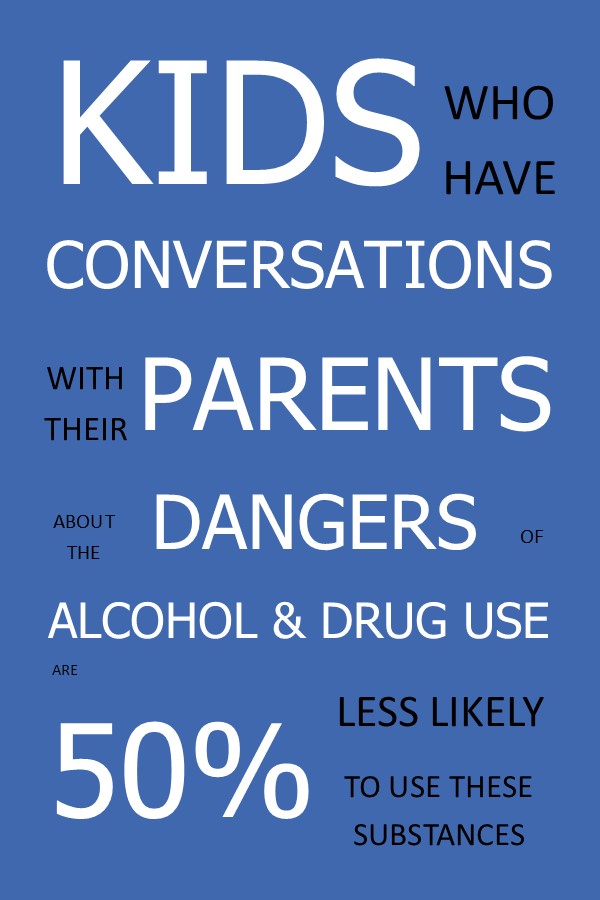
Alcohol Awareness Month:
Don’t wait to talk to your kids about alcohol.
Deborah Hendren, CSAPC – Substance Abuse Prevention Manager
Alcohol use by young people is extremely dangerous – both to themselves and to society – and is directly associated with traffic fatalities, violence, suicide, educational failure, alcohol overdose, unsafe sex and other problem behaviors, even for those who may never develop a dependence or addiction. Adolescence is a time of increased risk-taking, and as alcohol and drugs enter the picture, parents are faced with a unique set of challenges. Alcohol interferes with a person’s perception of reality and ability to make good decisions. This can be particularly hazardous for kids and teens who have less problem-solving and decision-making experience.
It can be daunting to talk with children about drinking and drug use, but it is well worth the effort parents put into it. In fact, research has shown that kids who have conversations with their parents and learn a lot about the dangers of alcohol and drug use are 50% less likely to use these substances than those who do not have such conversations.
 Here is some information and resources to help you get started.
Here is some information and resources to help you get started.
Short-term effects of alcohol use include:
- distorted vision, hearing, and coordination
- slurred speech
- drowsiness
- emotional changes
- altered perceptions and emotions
- impaired judgment, which can lead to accidents, drowning, and other risky behaviors, such as unsafe sex and drug use
- sleep disruption
- lowered body temperature
- hangovers
Symptoms of excess alcohol intake include:
- nausea and vomiting
- loss of bladder and bowel control
- blackouts, in which a drinker does not remember what happened while he or she was drinking
- temporary loss of consciousness
- coma
- death
Long-term effects of alcohol use include:
- cirrhosis and cancer of the liver
- loss of appetite
- serious vitamin deficiencies
- stomach ailments
- heart and central nervous system damage
- memory loss
- an increased risk of impotence
- high risk for overdosing
- brain damage
- seizures
- delirium
Research has shown that nearly 80% of high school kids have tried alcohol. Although experimentation with alcohol can be common among kids, it’s neither safe nor legal. So it’s important to start discussing alcohol use and abuse with your kids at an early age and keep talking about it as they grow up.
“Alcohol and drug use is a very risky business for young people,” says Andrew Pucher, President and Chief Executive Officer of NCADD,” and parents can make a difference. “The longer children delay drinking and drug use, the less likely they are to develop any problems associated with it. That’s why it is so important to help your child make smart decisions about alcohol and drugs.”
This April, during Alcohol Awareness Month, the Poe Center for Health Education encourages you to educate yourself and your loved ones about the dangers of alcohol. Long before your kids are presented with a chance to drink alcohol, you can increase the chances they will not be another statistic.
Learn more about talking with your child about alcohol.
Sources:
- The Effects of Alcohol Use. Drug Abuse.com
- Alcohol Awareness Month. US Department of Health and Human Services
Program Highlight: The Science of Addition
Interested in bringing information about alcohol use to your school or organization? The Science of Addiction is the newest Poe Center program developed within the Drug Education theater. This 75 minute session is targeted for 9th-12th graders.
The Science of Addiction is an interactive presentation involving discussion and role play to highlight the neurological ramifications when a psychoactive drug is introduced in the brain. Students will categorize drugs as hallucinogens, stimulants, and depressants and explain the characteristics of each, identify the neurotransmitters impacted by the introduction of the psychoactive drugs and describe the symptoms of drug use based on the neurotransmitters involved. Additionally, students will understand the biological constructs of tolerance and withdrawal.
Learn more about The Science of Addiction and other drug education programs.
To plan a program with the Poe Center, call (919) 231-4006 or schedule on line.

